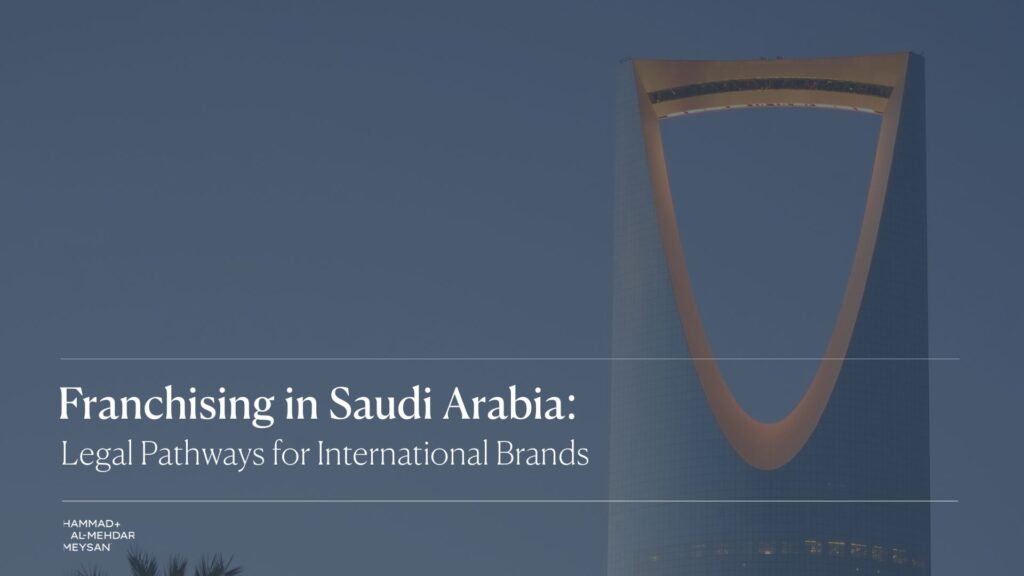
Saudi Arabia is undergoing one of the most ambitious economic transformations in the world. With a young, digitally connected population, rising disposable income, and government policies designed to attract international investment, the Kingdom offers fertile ground for global franchises. Food and beverage chains, fashion and lifestyle brands, healthcare providers, and education operators are already seeing demand surge. Entertainment and fitness concepts are also in high demand, reflecting changing consumer lifestyles. For international franchisors, Saudi Arabia is more than a regional gateway, it is a market in its own right.
The Franchise Law: Building Confidence and Transparency
The Saudi Franchise Law, introduced in 2019, created a comprehensive framework for franchising. The law was designed to build confidence for both franchisors and franchisees and to increase transparency in the sector.
Registration with the Ministry of Commerce
Every franchise agreement must be registered with the Ministry of Commerce. Without registration, the agreement has no legal effect. This process ensures contracts meet minimum standards and protects the rights of both parties.
Mandatory Disclosure
Franchisors must provide a disclosure document in Arabic before signing an agreement. This goes beyond a formality it sets expectations. It requires disclosure of fees, obligations, operational rules, and termination rights. For international franchisors, this means ensuring their global template agreements are localised for Saudi regulations.
Operational Track Record
A unique feature of the law is the requirement for franchisors to have at least one year of operational experience in Saudi Arabia before offering franchises. This prevents untested business models from entering the market and protects franchisees from high-risk ventures. For franchisors, it means considering joint ventures or company-owned pilots before launching a full franchise programme.
Intellectual Property: Protecting Brand Identity
Brand reputation is central to any franchise. In Saudi Arabia, trademarks and related IP should be registered with the Saudi Authority for Intellectual Property. Failure to do so leaves brands exposed to imitation and inconsistent standards. Strong IP protection ensures that franchisees deliver a consistent customer experience across all outlets.
Labour and Saudisation
Franchisors cannot ignore local labour policies. The Nitaqat programme, part of Saudisation, requires firms to employ a set percentage of Saudi nationals. These quotas vary by sector and company size. For franchisors, compliance requires careful workforce planning and often investment in training. The upside is access to a motivated young workforce, aligned with Vision 2030’s objective of increasing local employment.
Dispute Resolution: Planning Ahead
While the market is attractive, franchising disputes can and do arise. Agreements should specify clear dispute resolution mechanisms. Mediation and negotiation are encouraged for routine disagreements, but arbitration is often preferred for larger disputes. Well-structured provisions save time and cost and ensure business continuity.
Opportunities under Vision 2030
Vision 2030 has transformed the franchise landscape. The government is actively encouraging private sector growth and international partnerships. Opportunities exist across multiple industries:
- Food and Beverage – Fast-growing demand for global QSR and casual dining brands.
- Retail and Fashion – A strong appetite for luxury, lifestyle, and digital-first retail experiences.
- Healthcare and Education – Expansion of private healthcare and international schools under Vision 2030 reforms.
- Fitness and Entertainment – Rapid growth in gyms, cinemas, and leisure facilities.
International franchisors who align with Vision 2030 priorities – innovation, localisation, and private sector participation – will find strong support from regulators and investors.
Strategic Considerations for International Franchisors
- Localise your model – Adapt menus, formats, or services to meet Saudi cultural norms and consumer expectations.
- Protect your brand – Register trademarks and IP before market entry.
- Invest in people – Develop recruitment and training strategies that meet Saudisation targets.
- Plan your entry – Pilot operations or joint ventures can establish credibility before rolling out franchises.
- Think long term – Success requires more than a legal agreement; it requires a sustainable business model in a competitive and growing market.
Franchising in Saudi Arabia is both an opportunity and a responsibility. The Kingdom offers access to a large and fast-growing consumer base, but it also demands careful compliance with its franchise law, labour rules, and market expectations.
For international brands, success depends on more than signing agreements – it requires cultural adaptation, strong legal protection, and alignment with Saudi Arabia’s national priorities. Those who invest wisely, plan carefully, and build for the long term will find Saudi Arabia to be one of the most rewarding franchise markets in the world.
